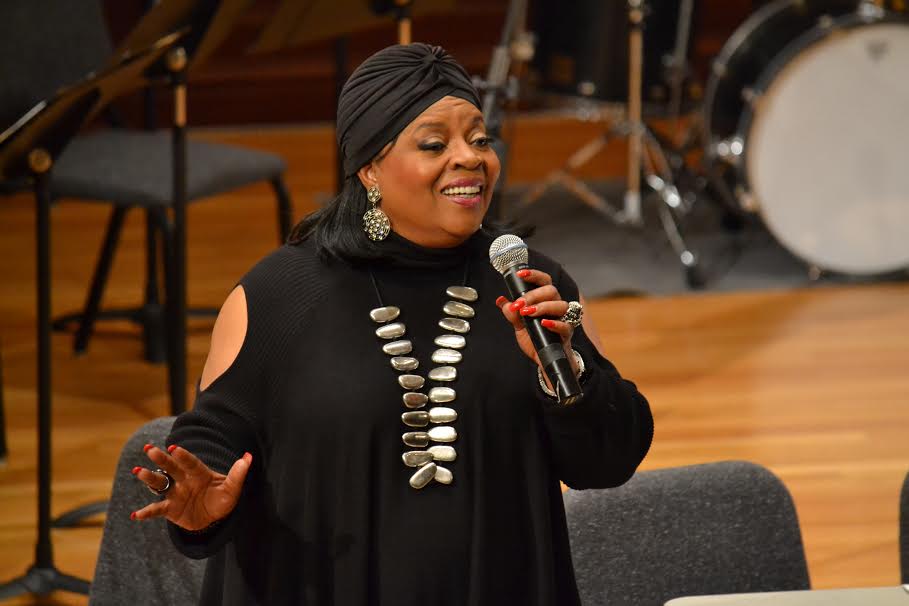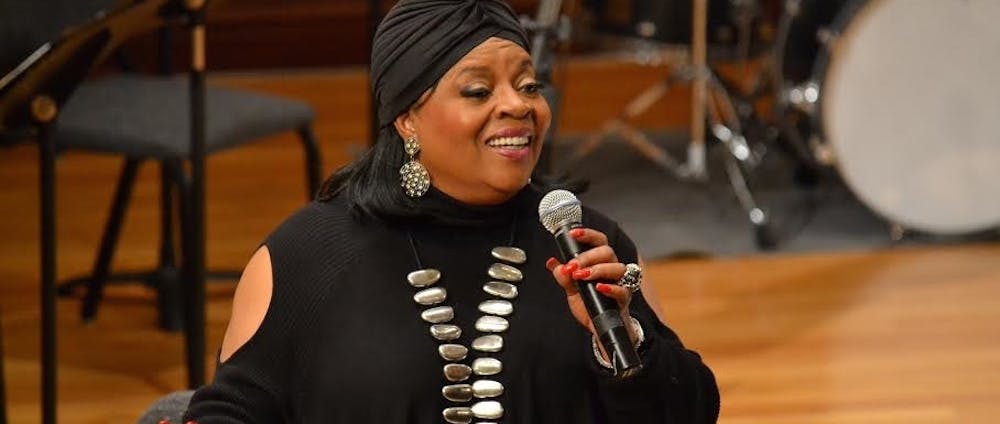By Heidi Cho
Staff Writer
Introduced with a snazzy new theme song and jazz music on Wednesday, Oct. 12, in Mayo Concert Hall, Trenton Makes Music focused on the history of blues and jazz for the project’s second event this semester.
Interviews with guest panelists provided insightful information about famous figures within the genres and the history behind them. The program also featured live performances by the panelists themselves and the College’s Jazz Ensemble, as well as video clips of performances from famous musicians interspersed throughout the night.
Kim Pearson, project director and an associate professor of journalism and professional writing, said that Trenton Makes Music is meant to capture the wonderful music that has come from Trenton, N.J., and is about “the great, untold story about Trenton music.”
Sarah Dash, a singer from Trenton, one of the founding members of Patti LaBelle and the Bluebelles and the creator of the Trenton Makes Music theme song, elaborated on the specifics planned for the night.
“Tonight is really a family reunion because we have some old school creators here and some new school innovators,” Dash said. “We’re going to be talking about jazz, blues and how it grew… the African migration from the south to the north, farms to the city… and you’re going to have people from out of Trenton High and Carver Center.”

Thomas Grice, a local jazz legend, was greeted by Dash as though he was family when he received an award onstage. As one of the oldest music teachers in Trenton, he has influenced many lives while performing and teaching. Grice was Dash’s teacher when she was 13 years old, she said.
Dash then turned to Gary Fienberg, conductor of the College’s Jazz Ensemble and an assistant professor of music, to answer questions regarding the beginning of jazz history. Jazz originated during the late 19th century as a distinct music form in the African American community, according to Fienberg. However, it wasn’t until the 1900s and 2000s that the genre became mainstream.
According to Fienberg, jazz music emerged all over the country, and it is a myth that New Orleans was the genre’s only birthplace.
“When people first heard jazz music, it was — for many people — a startling experience,” Fienberg said. “That strong rhythm and the passion in the music, really, for some people, this was too exciting, too strange, too exotic.”
Blues and jazz music were sometimes referred to as the “devil’s music” and had controversial beginnings. According to Fienberg, this negative view was due in part to the implausibility of something enduring coming from African American communities.
While there are those who had a poor response to jazz as a new musical form, there were others who were inspired by it, such as Jimi Hendrix, Robert Johnson and George Antheil, whose performances Fienberg analyzed for the audience.
“The unmistakable reference to jazz with his left hand, he’s striding on the keyboard… In the other hand, you hear kind of frantic rhythms — the jazz rhythms,” Fienberg said of one of Antheil’s performances.
Musician and panelist Joe Zook said that Hendrix “opened the universe up with a guitar.”
Zook had equally positive remarks about Johnson.
“They thought this man must have sold his soul to get that kind of talent in such a short time and be so much better than all the rest of us,” Zook said.
Dash, too, talked about Johnson’s talent.
“When Keith Richards first heard him play, he said, ‘Who’s playing with him?’ That’s how great this man was.”
Following live performances by Zook and his fellow panelist, blues musician Paul Plumeri, the discussion about these two legends — Hendrix and Johnson — were brought back into the night’s conversation one last time.
“I think (Johnson) only lived to be 27 years old,” Zook said. Zook later called Hendrix a modern Johnson due to their similar talent and an early death at 27 years old — an unfortunate trend in the music industry.
“I was told the stars shine so bright that it explodes and turns inside out, and therefore, it ends the life of the musician,” Dash said.







